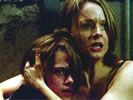Eye For Film >> Movies >> Panic Room (2002) Film Review
Panic Room
Reviewed by: Angus Wolfe Murray

Why would the wife of an industrial chemist, going through an acrimonious divorce, with a sickly looking 12-year-old, want to live in an Upper West Side mansion, large enough for an Edwardian family? How can she afford it?
Such questions become irrelevant once you realise that nothing quite fits conventional reality. As in The Others, the house has a character. The camera soars like a bird, zooming and floating through walls, pressing the audience into a voyeuristic role.

The panic room is a bunker, built off the master bedroom by the previous owner, an eccentric millionaire, as a place of refuge against attack. It is fully equipped for the long haul, has an independent phone line and a bank of televisions, connected to video cameras, discreetly positioned throughout the building. Meg (Jodie Foster) considers it an irrelevant oddity.
When the intruders break in, they don't expect to find anyone there - officially Meg takes possession the following week. Two of them have an intimate knowledge of the property. Burnham (Forest Whitaker) "spent 12 years of my life keeping people like us out." He designed and built the panic room. Junior (Jared Leto) worked as a nurse during the old man's final years. He brings along Raoul (Dwight Yoakum) as backup and Raoul is armed. Burnham wants nothing to do with him, but the stakes are high and it's too late to make changes now and so Raoul stays, a threatening presence in a balaclava mask.
Meg and the boy escape into the panic room, as the intruders advance up the stairs, but Burnham cuts off the phone before she can call for help. Under the carpet is a safe where a fortune in dollar bonds is stashed. Meg doesn't know about this and the burglars don't know how much.
They are not professional criminals, which means anger substitutes for experience, and Raoul shows signs of pathological disturbance. Meg proves more resourceful, although she has serious problems. Her son turns out to be a daughter (Kirsten Stewart), who suffers from diabetes. Without an insulin shot, she'll go into coma and die.
David Fincher (Se7en, Fight Club) is not a director who follows dotted lines. As a result, a claustrophobic tension runs through the movie, with a feeling of barely restrained violence. There is a moment in the middle, when Meg can't get out and the burglars can't get in, which reaches stalemate. Suddenly, you are aware of the plot's limitation, but it doesn't last. The final half hour is as unpredictable as it is fearful.
Foster and Whitaker are especially fine. She is a lioness, protecting her cub, and he a reluctant villain, incapable of controlling his crew. The house carries the signature of the paranoid recluse, still cold from his passing.
The room is not a refuge, rather a prison. Outside, in the echoing halls, frustration distorts the minds of desperate men.
Reviewed on: 19 Apr 2002



















